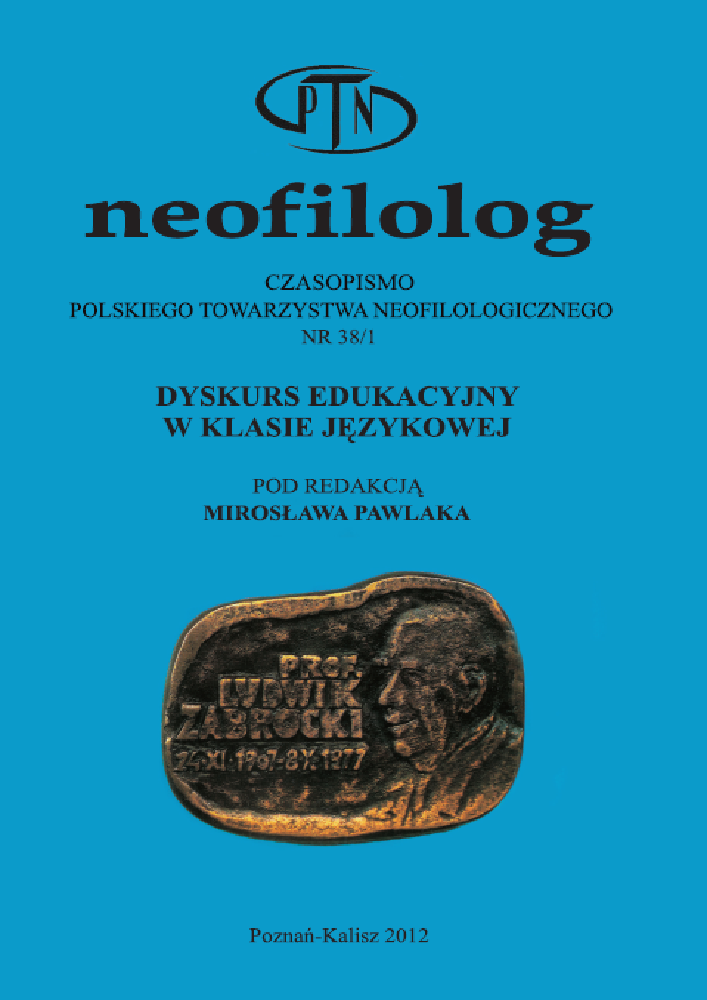Abstrakt
Despite its growing popularity within the humanities and social sciences, the concept of discourse (and also discourse analysis) continues to be perceived as rather vague by those who are not experts in the domain of discourse analysis. The aim of the present paper is to acquaint non-specialist readers with the multifold, interdisciplinary nature of discourse in order to further consider its usefulness with reference to foreign language pedagogy. It is argued that a wider use of this concept may lead us to a more coherent view of the main issues underlying our field, namely by integrating into our thinking both social and individual communicative practices. This idea is illustrated with selected conceptual tools and the views advanced by leading French discourse analysts (e.g. Charaudeau, 1993, 2010; Maingueneau, 1996, 2005) and, up to this point, mainly exploited in studying the media and public communication. Moreover, the importance of typological distinctions in foreign language pedagogy is stressed and an example of a discursive approach to foreign language instruction is provided. At the same time, attention is drawn to inherent and/or objective limitations on and difficulties in a wider use of the concept of discourse. These problems notwithstanding, the conclusion points to the fact that, given the complexity of our domain, it is hardly conceivable nowadays that we can be content with oversimplified formulae and limited, one-sided theories.
Bibliografia
Beacco, J.-Cl. 1996. „Linguistique de discours et enseignements de langues", [w:] Moirand, S. (red.). Le Français dans le Monde. Recherches et Applications, burner pec. Le discours: enjeux et perspectives. 183-192.
Charaudeau, P. 1992. „Sciences humaines, enseignement et culture" [w:] Le Français dans le Monde 253: 46-52.
Charaudeau, P. 1993. „Le discours de communication dans la situation de classe". [w:] Halte, J. F. (red.). Inter-Actions. Metz: Université de Metz. 121-135.
Charaudeau, P. 2010. „Pour une interdisciplinarité 'focalisée' dans les sciences humaines et sociales". Questions de Communication 17. (http://www.ques2com.fr/index.php?p=accueil&type=details&revue=51&id=51).
Duszak, A. i Fairclough, N. (red.). 2010. Krytyczna analiza dyskursu. Kraków: Universitas.
Council of Europe. 2001. Europejski system opisu kształcenia językowego: uczenie się, nauczanie, ocenianie. Warszawa: CODN.
Grzmil-Tylutki, H. 2010. Francuska lingwistyczna teoria dyskursu. Kraków: Universitas.
Górecka, J., Wilczyńska, W. i Wojciechowska, B. 2012. „Developing L2 oral competence through an integrated discursive approach: The conceptual framework of the project and the pilot study results", (w druku)
Kopaliński, W. 1995. Słownik wyrajów obcych i wyrażeń obcojęzycznych. Warszawa: Wiedza Powszechna.
Licencja
Prawa autorskie (c) 2012 Weronika Wilczyńska

Utwór dostępny jest na licencji Creative Commons Uznanie autorstwa – Bez utworów zależnych 4.0 Międzynarodowe.
Przedstawiany utwór (artykuł) upubliczniany jest na podstawie umowy z autorem i na licencji Creative Commons Attribution-NoDerivatives 4.0 International (CC BY-ND 4.0).
Użytkownicy mają obowiązek podania wraz z rozpowszechnionym utworem, informacji o autorstwie, tytule, źródle (odnośniki do oryginalnego utworu, DOI) oraz samej licencji;
- bez tworzenia utworów zależnych,
- utwór musi być zachowany w oryginalnej postaci.
Uniwersytet im. Adama Mickiewicza w Poznaniu zachowuje prawo do czasopisma jako całości (układ, forma graficzna, tytuł, projekt okładki, logo itp.).
